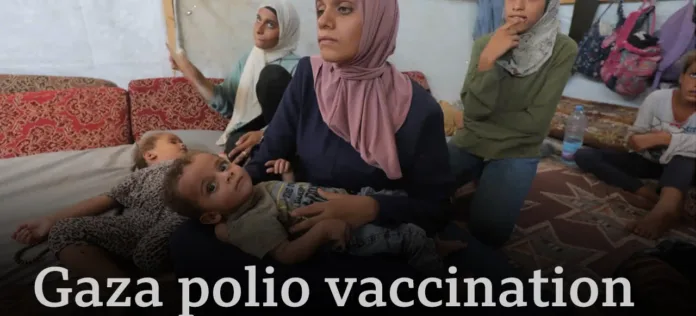Israeli army agrees to temporary cessations in fighting to allow the distribution of polio vaccines in Gaza, as international and regional tensions escalate
In the midst of the protracted Israel-Hamas conflict, the World Health Organization (WHO) has confirmed that the Israeli army has agreed to humanitarian pauses in Gaza. This crucial development aims to facilitate a polio vaccination campaign for children in the besieged territory. The announcement comes on Day 328 of the ongoing war, which has seen significant casualties and continued fighting.
The humanitarian pauses are intended to enable the safe delivery and administration of polio vaccines, crucial for preventing the spread of the disease among Gaza’s vulnerable population. These pauses are a rare but vital concession amid the conflict, reflecting growing international concern for the health and well-being of civilians caught in the crossfire.
The WHO’s announcement follows a series of recent escalations in the region. According to the UN watchdog, Iran has further increased its stockpile of uranium enriched to near weapons-grade levels, raising alarm about potential nuclear proliferation. Meanwhile, the European Union’s top diplomat has invited member states to consider sanctioning Israeli ministers accused of advocating war crimes.
In the West Bank, the Palestinian health ministry reports that 16 people were killed in the past 24 hours, underscoring the ongoing violence and instability. International leaders have intensified their calls for an immediate cease-fire. French President Emmanuel Macron and UK Labour leader Keir Starmer have both reiterated their demands for an end to hostilities, urging all parties to return to negotiations and seek a peaceful resolution.
The situation remains dire, with the humanitarian pauses in Gaza offering a glimmer of hope amid the broader crisis. The international community continues to monitor developments closely, advocating for measures to protect civilian lives and address the broader geopolitical tensions contributing to the conflict.
Analysis:
Political: The agreement on humanitarian pauses for polio vaccination in Gaza highlights the complex interplay between military strategy and humanitarian needs in conflict zones. Politically, the concession reflects pressures from international organizations and diplomatic efforts to mitigate civilian suffering. The involvement of global figures and institutions underscores the geopolitical significance of the conflict and the challenges in balancing military objectives with humanitarian concerns.
Social: The humanitarian pauses are a critical response to the social crisis unfolding in Gaza, where the ongoing conflict has exacerbated health crises and disrupted essential services. The polio vaccination campaign aims to address a public health emergency amidst the broader humanitarian disaster, illustrating the intersection of war and health crises. The international response, including calls for cease-fires, reflects a growing recognition of the need to protect vulnerable populations in conflict zones.
Racial: The conflict’s impact on various ethnic and racial groups in the region is significant, with the Palestinian population facing severe humanitarian challenges. The international community’s response to the crisis, including efforts to address health needs, indirectly touches on issues of racial and ethnic inequality. The broader geopolitical dynamics also influence perceptions and responses to the conflict, often reflecting underlying racial and ethnic tensions.
Gender: Gender dynamics in the conflict are less visible but still relevant. Women and children, who are disproportionately affected by the violence and health crises, face heightened vulnerabilities. The humanitarian pauses and vaccination efforts aim to address some of these gender-specific impacts by targeting the health needs of children, who are particularly at risk in conflict zones.
Economic: The conflict and its associated humanitarian crises have significant economic implications, both for the region and globally. The destruction of infrastructure and disruption of services in Gaza contribute to economic instability. Additionally, the international community’s efforts, including financial support for humanitarian aid and vaccination campaigns, reflect the economic costs associated with addressing and mitigating the impact of the conflict.
